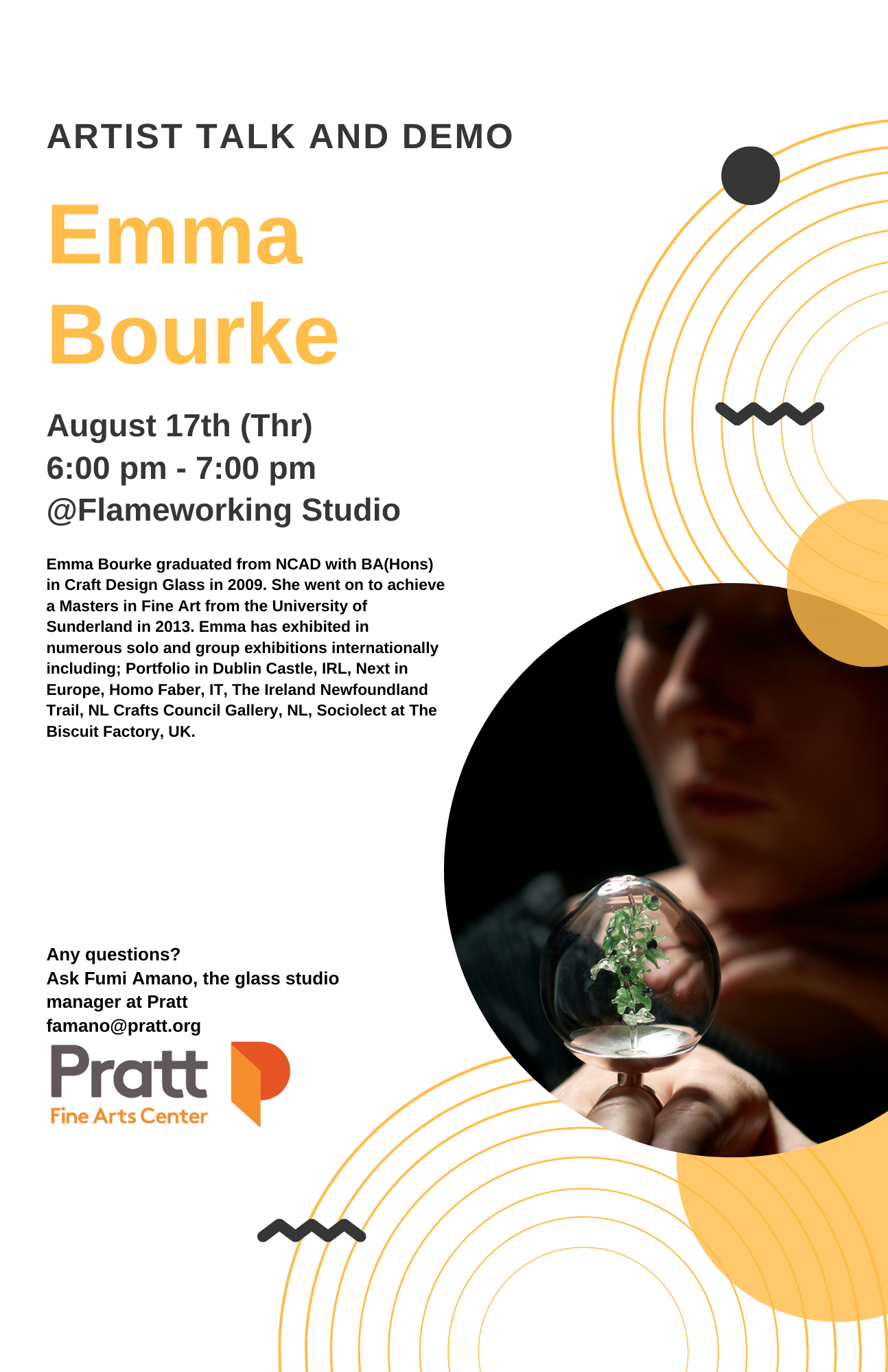
Come to Pratt Fine Arts Center’s Flameworking studio for a free artist talk by Emma Bourke!
6 pm – 7 pm
Thursday, 8/16/2023
Emma Bourke graduated from NCAD with BA(Hons) in Craft Design Glass in 2009. She went on to achieve a Master’s in Fine Art from the University of Sunderland in 2013. Emma has exhibited in numerous solo and group exhibitions internationally including; Portfolio in Dublin Castle, IRL, Next in Europe, Homo Faber, IT, The Ireland Newfoundland Trail, NL Crafts Council Gallery, NL, Sociolect at The Biscuit Factory, UK.
Bourke was commissioned to create the trophies for Allianz Business to Arts Awards 2019, 2021 Bourke was awarded the Agility Award IRL, she also won the Irish Fashion Innovation Awards; Jewellery Designer 2016, the Golden Fleece Award 2014, IRL, Future Makers Practioner Award 2014, IRL, Futures Fund 2013, UK, John and Elsie Burton Flamework Scholarship, Pilchuck Glass School 2013, USA. Bourke facilitated the Education Programme and was Director of Visual Arts for Westival in 2018 and 2019.
The National Museum of Ireland has a piece of Bourke’s work in their Collection and Emma’s thesis; Leopold and Rudolf Blaschka and their glass models of sea creatures were also acquired by the Corning Museum of Glass, as part of the Rakow Library’s Blaschka Archive. Bourke’s Ethnobotany Collection will be on permanent public display in the offices of Maurice Ward Art Handling in Dublin later this year.
An awareness of our heritage is essential to understand our identity and to contextualize our cultural experiences. Bourke’s research into botanical mythology helps her appreciate how communities have developed in tandem with the natural world. It enables her to construct a sense of place, delving into her personal experiences growing up in rural Ireland and combining this with botanical history, she builds a richer picture of how plants have shaped us.
Ethnobotany is a technical term that refers to actual evidence of people in specific areas using plants in a specific way, such as eating locally grown potatoes, thatching roofs with reeds, or cures made from wild herbs. Bourke is interested in the symbiotic relationship between people and plants, from seed migration to cultivation to medicinal uses; from local to global contexts.
In order to visualize her research Bourke has created a series of collections to encase her intricate glass flora. She has created collections based around vernacular wild plants which have traditional uses, predominantly as healing ingredients. Bourke takes a scientific approach when creating the petals and branches in glass, to scrutinize the physicality, scale, and fragility of the original plant. Each plant is encased in a glass form, from body parts to tea strainers, these forms reveal more about the story of the plants contained within. Translating the physical form of the plant into another material, such as glass, is another way to pass down information about a
plant. To date Bourke’s work is made from two materials only: glass and metal. These materials are timeless and sustainable, it’s important to Bourke that she creates works that exist both then and now; that speak both of our history and presence in 2023.
Any questions?
Ask Fumi Amano, the glass studio manager at Pratt
[email protected]


